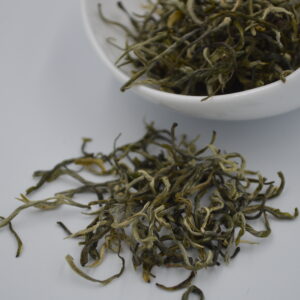Description
Matching Yunnan and Guangxi Tea Workshop
Orgin: Gantong, Dali, Yunnan Province
Harvest: 2021 spring before the Qingming Festival (Ming Qian)
Material: tender 1 sprout of original ancient Dali tea trees (Camellia taliensis)
- dry tea strip is wiry, white hair, silvery green and lustrous
- soup is brilliant green, clear and fresh
- taste fresh and mellow, sweet aftertaste,
- clean and high fragrance, flowery flavor
- wet tea is tender and fine
Introduction:
Located in northern Burma and Yunnan, China, Camellia taliensis grows in the evergreen broad-leaved forest and the mixed forest of 1300 meters to 2700 meters above sea level. Dali tea is a wild relative of cultivated tea. The existing wild community of Dali tea is rare. In recent years, it has been found in the investigation of ancient tea resources, all of which are island like discontinuous distribution. Camellia taliensis chemical constituents have been analyzed, the content of caffeine and amino acid is low, and the commercial value is not big. The value of Dali tea is mainly used in the scientific research of tea, which is of great significance to the application of tea science and Technology (resistance breeding, genetic engineering) and the research of tea academic problems.
Dali tea has a long history of utilization and Cultivation in Yunnan, and its possible utilization can be traced back to the written records of Tang Dynasty. In the West and south of Yunnan, there used to be a large area of Dali tea garden in history, but in the past 100 or 200 years, they have been gradually replaced by C. sinensis var. assamica. At the beginning of this century, due to the trend of Pu’er tea in the market, the vast area of wild Dali tea in Yunnan was cut down, picked all leaves or dug away for cultivation, which almost caused devastating damage to the natural resources of this tea species.
In 1985, in order to restore the famous historical tea, Xiaguan tea factory specially organized technical personnel to investigate and analyze the history and current situation of Gantong tea in Dali. After repeated trial production, Gantong tea was successfully made with spring tender buds and leaves as raw materials, referring to the processing technology recorded in history and combining with modern new technology. The recent popularity of decaffeinated tea has contributed to the popularity of this kind of tea.
Today, Gantong tea has been widely planted at the foot of Malong peak in Cangshan Mountain. Gantong temple covers an area of nearly 10 square kilometers. Buddha tea, once rare and hard to find, has entered the homes of ordinary people. Gantong tea belongs to the so-called “ancient arbor tea”. It is made from one bud and one leaf or one bud and two leaves as raw materials, and is processed by green killing, rolling, first drying, re kneading, shaping, fire, full fire and other processes.




























